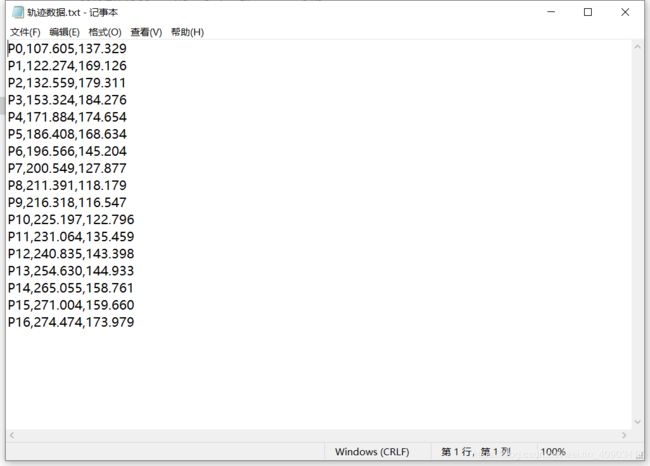C++ 道格拉斯-普克(DP)算法
道格拉斯-普克算法(Douglas–Peucker algorithm,亦称为拉默-道格拉斯-普克算法、迭代适应点算法、分裂与合并算法)是将曲线近似表示为一系列点,并减少点的数量的一种算法。该算法的原始类型分别由乌尔斯·拉默(Urs Ramer)于1972年以及大卫·道格拉斯(David Douglas)和托马斯·普克(Thomas Peucker)于1973年提出,并在之后的数十年中由其他学者予以完善。
算法的基本思路是:对每一条曲线的首末点虚连一条直线,求所有点与直线的距离,并找出最大距离值dmax ,用dmax与限差D相比:若dmax <D,这条曲线上的中间点全部舍去;若dmax ≥D,保留dmax 对应的坐标点,并以该点为界,把曲线分为两部分,对这两部分重复使用该方法。
// DP.cpp : 定义控制台应用程序的入口点。
//
#include "stdafx.h"
#include "iostream"
#include "fstream"
#include "string"
#include "vector"
#include "cmath"
#include
using namespace std;
class Point
{
public:
int ID;
string Name;
double x;
double y;
bool isRemoved = false;
};
double PointToLine(Point p1, Point p2, Point p3)
{
double dist;
double A, B, C;
A = -(p2.y - p1.y) / (p2.x - p1.x);
B = 1.0;
C = -A * p1.x - p1.y;
dist = abs(A * p3.x + B * p3.y + C) / sqrt(A * A + B * B);
return dist;
}
double getMaxDist(vector &Points, int begin, int end)
{
vector dists;
double maxdist;
for (int i = begin; i <= end; i++)
{
dists.push_back(PointToLine(Points[begin], Points[end], Points[i]));
}
auto max = max_element(dists.begin(), dists.end());
return *max;
}
int getMaxDistIndex(vector &Points, int begin, int end)
{
vector dists;
int index;
for (int i = begin; i <= end; i++)
{
dists.push_back(PointToLine(Points[begin], Points[end], Points[i]));
}
auto max = max_element(dists.begin(), dists.end());
index = Points[begin].ID + distance(dists.begin(),max);
return index;
}
void DP(vector &Points, int begin, int end, double threshold)
{
int mid;
if (end - begin > 1)
{
if (getMaxDist(Points, begin, end) > threshold)
{
mid = getMaxDistIndex(Points, begin, end);
DP(Points, begin, mid, threshold);
DP(Points, mid, end, threshold);
}
else
{
for (int i = begin + 1; i < end; i++)
{
Points[i].isRemoved = true;
}
}
}
else
{
return;
}
}
int _tmain(int argc, _TCHAR* argv[])
{
ifstream file;
ofstream out;
string line;
vector points1;
vector points2;
file.open("轨迹数据.txt");
if (!file.is_open())
{
cout << "The file doesn't exist!" << endl;
system("Pause");
exit(1);
}
Point point;
int count = 0;
cout << "raw data" << endl;
while (!file.eof())
{
getline(file, line);
char *cstr = new char[line.length() + 1];
strcpy(cstr, line.c_str());
char *p = strtok(cstr, ",");
point.Name = p; p = strtok(NULL, ",");
point.x = atof(p); p = strtok(NULL, ",");
point.y = atof(p); point.ID = count++;
points1.push_back(point);
points2.push_back(point);
cout << point.Name << "," << point.x << "," << point.y << "\n";
}
DP(points1, 0, 16, 5.0);
DP(points2, 0, 16, 8.0);
cout << "\n\nthreshold=5.0" << endl;
for (int i = 0; i < points1.size();i++)
{
if (points1[i].isRemoved==false)
{
cout << points1[i].Name << "," << points1[i].x << "," << points1[i].y << "\n";
}
}
cout << "\n\nthreshold=8.0" << endl;
for (int i = 0; i < points2.size(); i++)
{
if (points2[i].isRemoved == false)
{
cout << points2[i].Name << "," << points2[i].x << "," << points2[i].y << "\n";
}
}
return 0;
}
